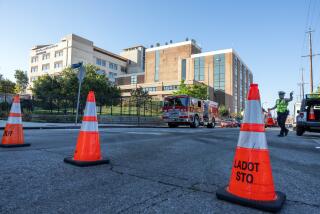Japan Nuclear Firm Ignored Warnings
- Share via
TOKYO — Admissions of ignored safety warnings and terrifying accounts of the burst of superheated steam that killed four people at the Mihama plant have put Japan’s nuclear power industry on the defensive.
The steam that erupted from a corroded pipe Monday was not radioactive -- just hot enough, at about 300 degrees Fahrenheit, to kill. But Kansai Electric Power Co.’s seemingly casual approach to maintenance at its facility 200 miles west of Tokyo has alarmed the public in a country already skittish about its dependence on nuclear power.
The company admits that it did not act on safety warnings from subcontractors.
Workers who survived the accident said the difference between life and death was whether they had been sitting on chairs, assembling equipment or were on their feet and able to rush for the door.
The four men who died had been sitting and were unable to escape the high-pressure steam and boiling water pouring from the sheared pipe above them.
Those who were standing escaped.
“It happened in an instant: The steam burst in and everything turned white,” said one of the hospitalized survivors, who was quoted in Japan’s Mainichi Daily News. “The floor was covered by hot water.”
The effect was lethal.
Masao Takatori said his 29-year-old nephew, Hiroya Takatori, “was frothing at the mouth -- I couldn’t bear to look at the body.” The family had sat with Hiroya’s body all night, he told reporters.
The workers were in a secondary facility next to Mihama’s No. 3 reactor, preparing the site for an inspection the company had scheduled for Saturday. They did not anticipate danger, and the only protective gear they wore were hard hats.
The building was considered so safe that the power company offered public tours, occasionally even taking groups of schoolchildren through.
Company executives acknowledge that they had been warned by maintenance subcontractors in April 2003 and again in November that pipes carrying high-pressure water and steam from the main reactor to another set of turbines needed to be replaced.
The pipe that burst had not been checked for corrosion since it was installed when the plant opened 28 years ago. Wear from the constant high-pressure steam reduced the pipe’s thickness over the years from its original 0.4 inch to one-tenth its original size, far below the minimum safety requirement -- making it visibly thin, “even to a layman,” Industry Minister Shoichi Nakagawa said after he toured the scene.
Executives told reporters Wednesday that they had believed they could postpone safety checks on the pipes until this month.
“We had never expected such rapid corrosion,” said Akira Kokado, Mihama’s deputy plant manager.
Japan’s nuclear watchdog agency has given four companies that use similar designs a week to ensure its pipes are safe, a survey that will affect nearly half of the nation’s 52 nuclear plants. Police are also investigating whether there are grounds to bring charges of professional negligence.
Both the nuclear industry and its advocates in Japan’s government have struggled to find the right calibration in tone between promises to get tough on safety violations and attempts to restore public confidence. In recent years, the industry has been beset by scandals, including cases of utilities covering up safety violations and reactor defects.
Yet in a country almost barren of oil and coal, nuclear power fills about one-third of the energy demand. Japan, already the world’s third-largest commercial nuclear power after the United States and France, plans to build 11 plants within a decade.
That goal seemed farther off Wednesday, as people absorbed images of power company President Yosaku Fuji bowing in apology to distraught family members of the victims. They made it clear, as Fuji himself said, that the tragedy “was not something that could be laid to rest by an apology.”
Images of nuclear power executives prostrating may only stiffen public opinion against building new nuclear plants. But even critics accept that blocking new reactors means Japan will have to rely more on its aging ones.
“It’s a vicious cycle,” said Hideyuki Ban of the Citizens’ Nuclear Information Center, a leading critic of nuclear power.
More to Read
Sign up for Essential California
The most important California stories and recommendations in your inbox every morning.
You may occasionally receive promotional content from the Los Angeles Times.













